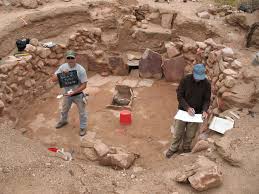What is Archaeology?
Archaeology is the study, analysis, and storage of human remains such as skeletons, tools, artifacts, plant remains, and sediments in order to reconstruct human history and culture. Its subjects include much more than societies and cultures, ranging from the exploration of human origins and early hunter-gatherer communities, to the ancient environments, arts and cultural practices. Archaeology is a field of people who enjoy history and are fascinated with finding lost civilizations. An archaeologist would be an expert on the tools and techniques used in excavation and reconstruction. He has a broad understanding of human prehistory, from early migration and tool use to the emergence of the first civilizations. He'll be well-versed in a variety of prehistoric cultures, including their technologies, colonies, and migrations. He may be able to read and write in ancient languages.
Although the study of Archaeology will create a base in archaeological skills, it will also teach more general skills such as critical thinking, the ability to construct a logical argument, the ability to synthesize large quantities of data, and the ability to convey concepts simply and persuasively both orally and in writing. Foreign languages are also studied in many degrees.
Archaeologists are in high demand all over the world, not just in academia but also in research firms. Professional archaeologists now use the following new techniques to help in accuracy:
- Genetic study
- Radiocarbon dating
- Thermography
- Satellite imaging
- MRI
What do Archaeologists do?
An essential aspect of archaeology is the dual approach of fieldwork and laboratory research. Since archaeology is often studied in conjunction with anthropology, history of art, classics, or history, it is often concerned with literary facts and the study of languages as well.
Major responsibilities of an archaeologist include:
- locating suitable excavation sites using a range of techniques, including geophysical surveys and aerial photography
- examining, documenting and preserving artefacts
- recording and interpreting sites and findings, as well as producing models of how they may have appeared in the past, using computer technologies such as computer-aided design (CAD) and geographic information systems (GIS).
- making, collecting, and storing published, digital, and drawn records, and electronic databases
- supervising and directing workers
- data collection, analysis, and interpretation
- writing of reports, articles, and papers for publications
- dating and interpretation of findings
- assessing planning applications for building developer
Scope of Archaeology
There are several archaeological sites in Pakistan, including Mohenjo-daro, Harappa, Taxila, Takht-i-bai, Mehrgarh, and others. There are also several sites that are yet to be explored. You may work with many government and private organisations. Professional historians, museum curators, conservation and heritage specialists, social researchers, and tourism officers are among the jobs available to archaeology graduates. Archaeology graduates work in a variety of fields, including education, television, advertisement, and public service, as well as business and industry.
Archaeology has evolved into a science as a result of the use of advanced technology in the field.
Branches of archaeology
- Archaeozoology
- Archaeobotany
- Urban archaeology
- Environmental archaeology
- Geoarchaeology
- Marine archaeology
- Palaeontology
How to become an archaeologist
Students who have 12 years of education are eligible to pursue archaeology at the bachelor level. Those students who have passed bachelors degree in science and arts disciplines and are interested to lead a career in archaeology are eligible to pursue it at the master and doctoral level
Best universities
Quaid-e-azam University
University of Sindh
University of Peshawar
The Islamia University of Bahawalpur
Abdul Wali Khan University, Mardan
Shah Abdul Latif University
University of Balochistan
For more details on institutes offering archaeology, https://www.eduvision.edu.pk/institutions-offering-archaeology-with-field-social-sciences-at-bachelor-level-in-pakistan-page-1
Archaelogy Job Market
Here are some employment areas for you after pursuing education in archaeology:
- Museum
- Colleges
- Universities
- Cultural centers
- UNESCO
- research labs
- Department of archaeology and museums (DOAM)
- NGOs
- Private museums
- International organizations
Qualities required for archaeology
- Good communications skills to communicate with locals as well as researchers in conference
- Extraordinary knowledge and interest of history
- Stamina to work for months on sites
- Ability to work as team member
- Must be adventure loving
- Having reading habit
- Passion and commitment
Views: 71152






